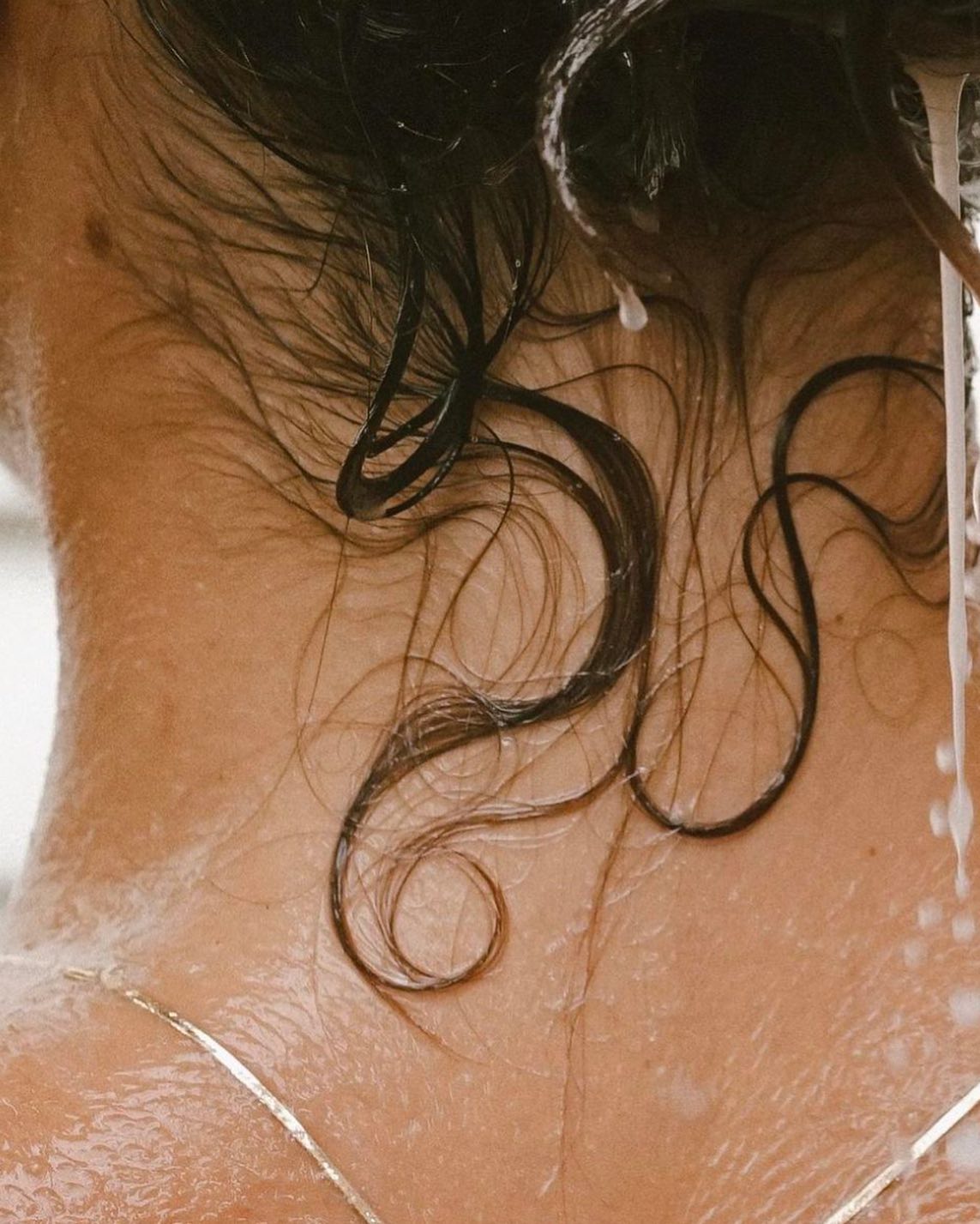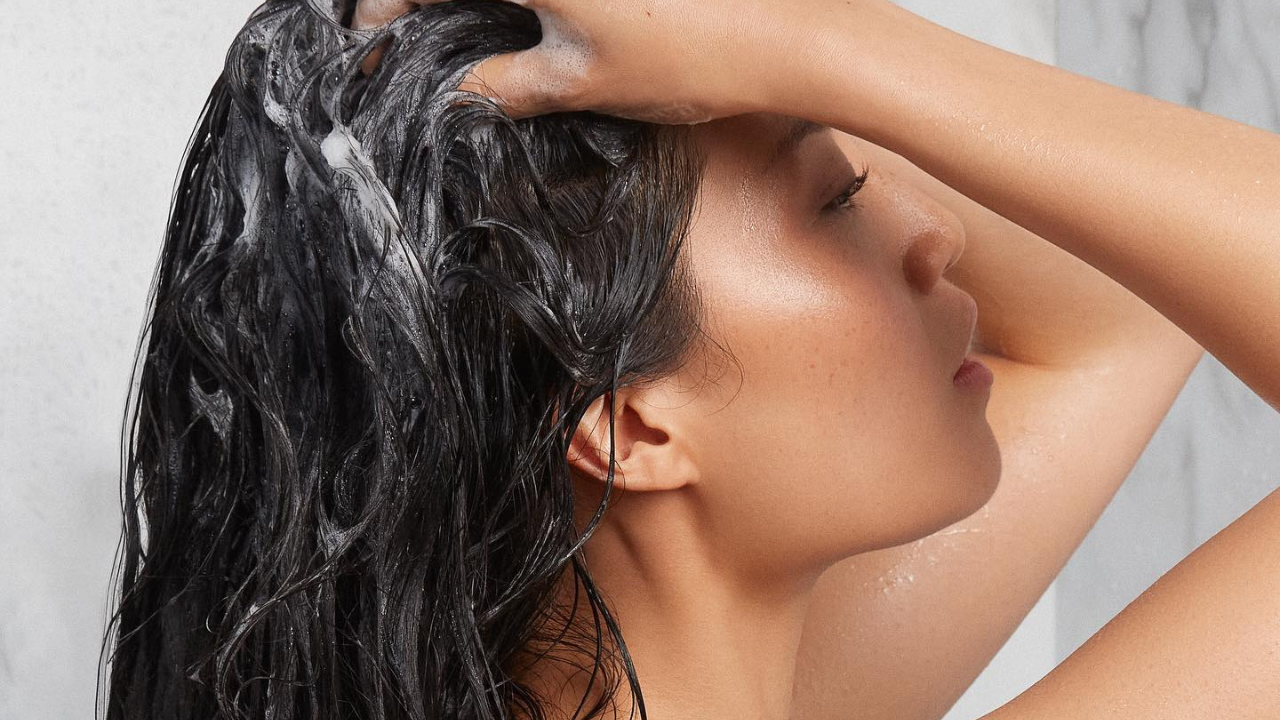
To look at me, you might think I’d been blessed with a healthy (though possibly slightly tangled – sorry mum) head of hair: it’s thick and it’s down to my hips. But – come a little closer – and you’ll discover that I suffer from stubborn seborrheic dermatitis, a common condition that causes a red, flaky and itchy rash on my scalp, especially when I’m stressed. In times gone by, I might have daubed my head with stinking Polytar (if you don’t know what that is, count yourself lucky) and hoped for the best. In 2023, though, I’m spoiled for choice. Scalp care has become something of a phenomenon – and not just for people with skin conditions, like me. We should all be thinking of our scalp as an extension of our face – and lavishing it with just as much attention.
HEALTHY SCALP, HEALTHY HAIR
“Many individuals focus solely on their hair, ignoring the condition of their scalp,” says Dr. Radmila Lukian, a dermatologist at Dubai’s Lucia Clinic. “This oversight can lead to various scalp issues, including dryness, dandruff, or even more serious conditions like dermatitis. Ignoring scalp health can have a cascading effect on the overall health and appearance of the hair.”
The basics of scalp care are the same as with skincare – remove product build-up, sebum (oil to you and me) and dirt regularly. To get a little technical (or biological, I should say) your scalp is composed of five layers of soft tissue and roughly a hundred thousand hair follicles, through which each hair grows. Every follicle contains a sebaceous gland, which secretes sebum. Your scalp also houses an intricate microbiome; an ecosystem of trillions of microorganisms that work together to contribute to overall scalp health, protecting against pathogens, infection, toxins and irritation, thus maintaining the skin barrier. When our microbiome is disrupted, and overgrowth or shortage of certain microbes occurs, several issues arise, such as itchiness, irritation, dandruff, hair breakage and eventually hair loss.
“Scalp health should be taken as seriously as overall skin health, and getting to know your own scalp is key,” says Sam Carpenter, hairstylist educator at EIDEAL. A healthy scalp “will be producing the correct amount of sebum from the sebaceous gland, which secretes onto the scalp, leaving it hydrated and protected. Sebum also forms part of the building blocks for hair growth, think healthy scalp, healthy hair.”
SCALP CARE IS FOR EVERYONE
Scalp care is not exclusive to individuals with troublesome skin complaints. “While those with conditions like psoriasis or eczema may require specialised care, maintaining a healthy scalp is essential for everyone,” says Dr. Lukian. “Even individuals without apparent scalp issues can benefit from a regular scalp care routine to prevent potential problems and maintain optimal hair health.” We’re all comfortable with the basics of haircare and skincare: shampoo, condition, exfoliate, cleanse, tone, moisturise. Scalp care is no different. “The idea of a multi-step skincare routine for the scalp has gained popularity, and for good reason. The scalp, like the skin on the rest of the body, benefits from a thoughtful and targeted approach to care, though the specific steps and products needed can vary depending on individual hair and skin types.”
It’s lucky, then, that consumers are spoiled for choice. Scalp care is buzzier than a beehive in the beauty world. There are now thousands of products sitting at the intersection of beauty and haircare, helping you to individualise your routine. This new science and ingredients-led focus has been dubbed the “skinification” of the scalp, with brands including Augustinus Bader, Aveda, Percy and Reed and Drunk Elephant throwing their hats into the ring. You’ll find our complete list of recommended products below, but first – some general rules of thumb.

TOP TIPS
Play it cool
“We all love a hot shower, it feels fantastic, but your scalp is skin so you can easily burn it and cause a lot of damage,” says Dr. Ahmed El Muntasar, GP and award-winning aesthetician. Lukewarm water –sorry!- is best. And on that note…
Gently does it
“Brushing your scalp aggressively can cause a lot of breakage and trauma,” Dr. El Muntasar continues. You should never comb your scalp directly – start at the ends and work your way up.
Don’t overwash
In general, we should be washing our hair two to three times a week. Any less, and we compromise on hygiene and run the risk of breakouts, dandruff and dermatitis. Any more, and we parch our skin of moisture. “I recommend only washing when hair starts to feel oily or dirty,” says Jaja Jones, owner and Creative Director of The Den salon. “If you wash your hair every day,” says Sam Carpenter, “you are washing away your skin’s protective layer and may cause a dry scalp. Instead, it might be worth considering using a dry shampoo such as Olaplex’s 4D. Spray it through freshly washed hair and it should give you an extra day or two between washes.”
Enemy ingredients
“Harsh chemicals, sulfates, parabens, silicone and excessive use of alcohol-based products can strip the scalp of its natural oils, leading to dryness and irritation,” says Dr Lukian. So make sure to always read the small print, and if in doubt, go fragrance-free.
A home-made remedy
“If you want to go 100% natural, then I would use home remedies such as an organic apple cider vinegar rinse to balance the pH of the scalp,” recommends Jaja Jones. “After shampoo and conditioning, mix one part of the vinegar with five parts water. Then cover the hair for five minutes with the mixture before washing off.”
Let that sink in…
“Because the scalp skin is much thicker than elsewhere on our body, it’s not very absorbent,” says Dr El Muntasar. “Some studies show that it can take up to 10 minutes of a product being on your scalp for it to be absorbed. So, take your time when applying your treatments so you’re not just washing your hard-earned money down the drain.”
And finally…
If your scalp is not responding to treatments, or you are experiencing persistent itchiness, flakiness or hair loss, book in with a dermatologist, who can diagnose and treat the issue as safely and effectively as possible.

SHOP THE STORY
From scalp soothing serums to gentle head buffers, discover GRAZIA’s edit of the best scalp care products below.
The Treatment

A plant-powered, hydrating serum from a skincare powerhouse, suitable for all hair types.
The Shampoo

“The energising range from Natural Tech by Davines is a multi-step approach to treating all types of thinning hair. It has a shampoo, leave-in drops and a gel to improve scalp health by using Phytoceuticals,” says EIDEAL’s Sam Carpenter.
The Scrub

An award-winning scrub from scalp-care pioneer Christophe Robin, which exfoliates and soothes irritated skin while removing impurities.
The Revitaliser

A bio-fermented, Ayurvedic herb blend with ginseng and turmeric, that revitalises the scalp and reduces hair loss.
The Strengthener

A leave-in concentrate rich in sweet white Lupine, an active rich in peptides and vitamins, which facilitates the supply of oxygen and other key nutrients to the scalp, promoting a healthy, strong foundation.
The Serum

A skincare-inspired scalp serum THAT supports thicker, and fuller-looking hair, it’s designed to support your scalp while creating a healthy barrier.
The Purifier

This weekly shampoo boasts clarifying properties that work to dispel impurities, offering a thorough cleansing treatment that won’t strip away natural oils.
This story first appeared on GRAZIA International.
